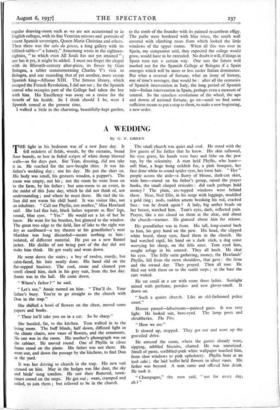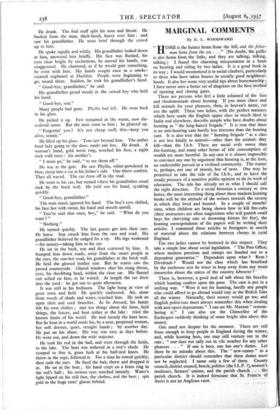A WEDDING
By G. F. GREEN
THE light in his bedroom was of a new June day. It fell redolent of fields, woods, by the curtains, broad floor boards, to lose in faded stripes of white damp blurred walls—as for days past. But Tom, dressing, did not take it in. He reached for the new-bought shirt. It was his father's wedding day ; not his day. He put the shirt on. His body was small, his gestures wooden, a puppet's. The room was empty, not his ; not the room he went from on to the farm, by his father ; but ante-room to an event, in the midst of this June day, which he did not think of, not understanding ; and where he must dress. He tied the tie. Sun did not warm his chill hand. It was visitor like, not an inhabiter. " Call me Phyllis, not mother," Miss Howland said. She had flax hair, black lashes separate as flies' legs, round, blue eyes. " Yes." He would see a lot of her he knew. He went for his brushes, but glanced to the window. The great tree edge to the field, line of lake to the right was dry as cardboard—a toy theatre at his grandfather's near Marlden was long discarded—meant nothing to him : isolated, of different material. He put on a new flannel jacket. His dislike of not being part of the day did not make him think. He got ready and went down.
He went down the stairs ; a boy of twelve, sturdy, but calm-faced, his hair neatly done. His hand slid on the flat-topped banister. The cool, stone and cleaned pan smell closed him, dark in his grey suit, from the hot day. Annie was in the hall. He came down.
" Where's father ? " he said.
" Let's see," Annie turned on him. " That'll do. Your father's busy. You're to go straight to the church with Don in the trap."
She shifted a bowl of flowers on the chest, moved some papers and books.
" Their lot'll take you on in a car. So be sharp."
She bustled, fat, to the kitchen. Tom walked in to the living room. The buff blinds, half down, diffused light in the chintz chairs, new vases of flowers, and the ornaments. No one was in the room. His -mother's photograph was on the cabinet. He moved round. One of Phyllis in silver frame stood on the piano. His father was not there. He Went out, and down the passage by the kitchens, to find Don in the yard.
It was hot driving to ehtireh in the trap. His new suit creased on him. May in .the hedges was like dust, the sky and birds' song toneless. He saw their fluttered, town- sman crowd bit the steps: He got out ; went, cramped and soiled, to join them ; but relieved to be in the church. The small church was quiet and cool. He stood with the few guests of his father that he knew. His skin sallowed, his eyes grave, his hands were bare and lithe on the pew top, by the solemnity. A man held Phyllis, who leant— soft blue, a huge hung reddish fur, a pink bouquet, her face done white to round spider eyes, her loose hair. " Her " people across the aisle—a flurry of blouse, dark-cut skirt, wide hats—stared on his father's group, raised the prayer books, the small clasped reticules : did each perhaps hold money ? The plain, arc-topped windows were behind them. Near, Ned Ellis, in his serge with leggings, muddled a gold ring ; nods, sudden amens breaking his red, cracked face : was he drunk again ? A lady, big amber beads on her breast, watched him. Tom's eyes, dark, reflected pain. Prayer, like a net closed on them at the altar, and about the church—warmer. He glanced about him for release.
His grandfather was in front. His tall, long-coated back to him, his grey hand on the pew. His head, the clipped white beard, sharp eyes, fixed them in the church. He had watched rigid, his hand on a dark stick, a dog cease worrying his sheep, on the fells once. Tom eyed him, sought refuge in his control. They all knelt. He shut his eyes. The frilly satin gathering, money, the Howlands' Phyllis, fell from the stern shoulders, that gave : the farm and the owned day. They prayed. Then all rose. He filed out with them on to the sunlit steps ; at the base the cars waited.
He sat small in a car with some three ladies. Sunlight mixed with perfume, powder- and new gloves-smell. It drove on.
" Such a quaint church. Like an old-fashioned police court."
Houses passed—laburnums—painted gates. It was very light. He looked out, bare-eyed. The lamp posts and shrubberies. The Firs.
" Here we are."
It slowed up, stopped. They got out and went up the gravelled drive.
He entered the room, where the guests already were, sipping, nibbled biscuits, chatted. He was unnoticed. Smell of paste, scribbled-pink white wallpaper touched him, from shut windows to pink upholstery. Phyllis bent at an iced cake ; the laid buffet held flowers in silver vases. His father was beyond. A man came and offered him drink. He took it.
" Champagne," the man said, " not for every day, eh ? " He drank. The foul stuff split his nose and throat. He backed from the man, thick-faced, heavy over him : and saw his grandfather. He went brief through the crowd up to him.
He spoke rapidly and wildly. His grandfather looked down at him, answered him briefly. His face was flushed, his eyes clear bright by excitement, he moved his hands, was exaggerated. He chattered, as if he would gain something, be even with him. His hands sought once in a smoke- scented cupboard at Marlden. People were beginning to go, round them. Sudden, he took his grandfather's hand. " Good-bye, grandfather," he said.
His grandfather gazed steady at the cowed boy who held his hand.
" Good-bye, son."
Many people had gone. Phyllis had left. He went back to his glass.
He picked it up. Few remained in the warm, now dis- ordered room. But the man came to him ; he glanced up.
" Forgettin' you ? It's not cheap stuff, this—keep you alive, sonnie."
He filled up his glass. ' Tom saw beyond him. The amber bead lady going to the door, made one less. He drank. A woman's hand, gold worn ring, touched his face, a night dark with trees : his mother's.
" I must go," he said, " to see them off."
He was at the gate. He saw Phyllis, white-powdered in blue, stoop into a car at his father's side. One threw confetti. They all waved. The car drew off in the road.
He went to his car, but turned where his grandfather stood dark by the brick wall. He held out his hand, speaking quickly.
" Good-bye, grandfather."
The man stood, ignored his hand. The boy's eyes shifted, his face hot with sweat, his hand and mouth unstill.
" You've said that once, boy," he said. " What do you want ? "
" Nothing."
He turned quickly. The last guests got into their cars. He knew. Sun struck him from the cars and road. His grandfather believed he cadged for a tip. His legs weakened —for money—taking him to his car.
He sat in the back, sun and dust scattered by him. It bumped him down roads, away from the smart people at the cars, the sun-hot road, his grandfather at the brick wall.
He held the glossed leather seat. But he scarce saw the passed countryside. Glazed windows shut his stung throat, eyes, his throbbing head, within the close car. His flannel suit ached on him, as he waited. At length the car drew into the yard : he got out to quiet afternoon.
It was still in his bedroom. The light hung in view of great trees and field. He quickly undressed. Air, alone from woods of shade and water, touched him. He took an open shirt and cord breeches. As he dressed, his hands felt his own clothes ; met too things about the farm, field things, the fences, and boat tether at the lake : tried the known limits of his world. He tied loosely the knee laces. But he bent in a world made his, by a near, perpetual woman, her soft dresses, quiet, straight hands ; by another day. He put on his shoes. His way was easy as days before. He went out, and down the wide staircase.
He took his rod in the hall, and went through the fields, to the lake. The boat was tethered in a tree's shade. He stooped to free it, grass lush at his half-tied knees. He threw in the rope, followed it. For a time he rowed quickly, then sank the oars. He fixed the bait, threw and dropped it in. He sat in the boat ; his hand crept on a brass ring in the rod's haft ; his serious eyes watched intently. Water's light lipped on his still face, the clothes, and the boat ; spit gold in the huge trees' gloom behind.







































 Previous page
Previous page